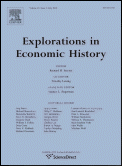
Entry, Information, and Financial Development: A Century of Competition Between French Banks and Notaries
Poorly developed financial markets are widely believed to block economic growth, because only modern financial intermediaries such as banks can mobilize large amounts of financial capital at low cost. This claim is supported by cross country regressions, but the regressions assume that credit intermediation is measured accurately before modern financial intermediaries arrive. If traditional intermediaries were mobilizing large amounts of financial capital before banks or other modern intermediaries appear, then the strength of the relationship between financial development and economic growth would be cast into doubt. Using an original panel dataset from nineteenth-century France, we provide the first estimates of how much financial capital key traditional intermediaries (notaries) were mobilizing for an entire economy during its first century of economic growth, and we analyze the lending that the notaries made possible in French mortgage market. The amount of capital they mobilized turns out to be large. We then analyze the effect that financial deepening had on the notaries as banks spread and find that the banks' and notaries' services were in all likelihood complements. The implication is that the link between financial development and economic growth may therefore be weaker than is assumed.
